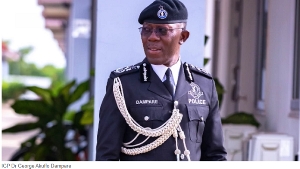 Inspector-General of Police Dr George Akuffo Dampare
Inspector-General of Police Dr George Akuffo Dampare
Introduction
The appointment of the Inspector General of Police (IGP) has long been a contentious issue in Ghana. Traditionally, the IGP has been appointed by the President, a practice that has raised concerns about political interference and bias in the police service. As the country prepares to appoint a new IGP, we argue that it's time for a change. The next IGP should be elected by officers in uniform, rather than appointed by the executive.
Reasons for Election over Appointment
1. Independence: An elected IGP would be more independent and less susceptible to political pressure, allowing for unbiased decision-making.
2. Accountability: Officers in uniform would hold the IGP accountable for their actions, ensuring transparency and responsibility.
3. Representation: An elected IGP would represent the interests of the police service, rather than political interests.
4. Morale Boost: Election by peers would boost morale and motivation among officers, leading to improved performance.
5. Reduced Politicization: Election would reduce politicization of the police service, allowing for a focus on professional policing.
Achievements of Dr. Dampare
- Successful career spanning over two decades
- Rise through the ranks from Constable to Commissioner of Police
- Notable accomplishments in crime reduction and community policing
- Established the Police Intelligence and Professional Standards (PIPS) unit
- Implemented the "Police Model Station" initiative
- Enhanced police-public relations through community engagement
- Introduced the "Police Visibility" strategy
- Strengthened international partnerships for capacity building
- Improved police training and capacity development
- Enhanced police welfare and infrastructure development
- Successfully led the police in maintaining law and order during the 2020 general elections
- Played a crucial role in the country's response to the COVID-19 pandemic
- At Police Headquarters:
- Reorganized the police command structure for efficiency
- Established the Police Crime and Intelligence Analysis Unit (PCIU)
- Implemented the "Police Digitalization Project" for improved data management
- Enhanced police accountability with the "Police Complaints Unit"
The Current Limitations
Under the current appointment system, the IGP may not always act independently. Since their appointment comes from the President, they may feel obligated to carry out the President's bidding, even if it contradicts their professional judgment. This can lead to:
- Inefficiency: The IGP may be forced to implement policies that are not in the best interest of the police service or the country.
- Lack of Effectiveness: The IGP's hands may be tied by political interference, preventing them from taking decisive action against crime and corruption.
Some Wrong Decisions Under Current IGP
- The controversial arrest and detention of political opponents
- The violent suppression of peaceful protests
- The selective enforcement of laws, favouring political allies
- The failure to investigate and prosecute high-profile corruption cases
- The harassment and intimidation of journalists and media outlets
- The recent detention of the NDC parliamentary candidate for Kasoa, Mr. Edwin Gomez, on trumped-up charges
- The failure to investigate and prosecute electoral violence committed under Nana Addo's administration, including:
- The assault on innocent citizens at the Ayawaso West Wuogon by-election
- The shooting of protesters at the Kumasi Technical University
- The brutalization of opposition supporters at the 2020 general elections
- The shooting at Techiman West during the voter registration exercise
- The violence at Odododiodio in 2020, including:
- The attack on the NDC's campaign team
- The beating of supporters
- The destruction of campaign materials
- The shooting at Techiman South that claimed lives
- The recent violence committed during the registration of first-time voters and transfer of votes, including:
- The beating of opposition supporters at registration centres
- The seizure of voter registration materials by political thugs
- The intimidation of election officials to favour certain political parties.
As we head towards the 2024 General Elections, it is imperative that the IGP takes a firm stance against political bias and partisanship within the police service. The wrongful detention of NDC members by some police officers wearing political shirts or attires must stop.
The IGP must issue a strong warning to these officers, emphasizing the need for neutrality and professionalism in their duties. The police service must remain impartial and ensure a level playing field for all political parties.
It is precisely because of the attitudes and actions of some of these officers that I propose we try a new approach: electing the IGP. Will an elected IGP also make wrongful decisions from the Executive, or will they execute their work with or without political connotation or interference? Let us give it a chance and see if it yields a more independent and professional police leadership.
By electing the IGP, we can ensure that the police service is led by someone who is accountable to the officers and the people, not just the political elite. It's time to break away from the shackles of political interference and let the police service operate independently, with a leader who is chosen based on merit and competence, not political allegiance.
Let us seize this opportunity to reform the police service and make it a true institution of the state, not a tool for political oppression. Electing the IGP is the first step towards a more democratic and accountable police service.